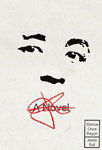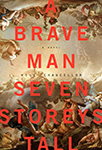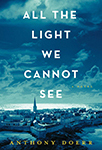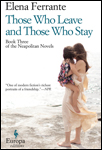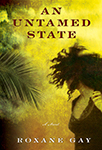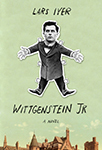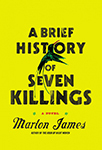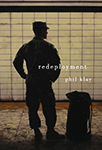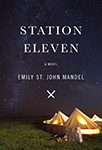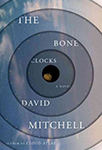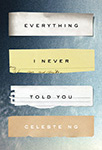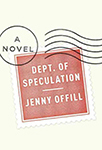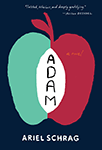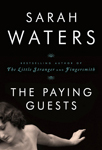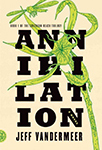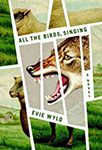by Jesse Ball
30% OFF at Powell’s »Amanda McClendon: I work for a largish public library system. Station Eleven and All the Light We Cannot See both have request lists in the lower dozens—more than most books in the stacks, but they’re not Fifty Shades or the next Harry Potter. They’ll both be book club reads; well-educated middle-class people will read the mess out of these (and have, if the New York Times bestseller lists are any indication). Someone will probably make a movie or an HBO miniseries out of them, or should, anyway. I feel like I should keep my copies for my yet-unborn children, because in the 2040s or ’50s some English professor will teach a class on the early-21st-century novel, and I feel like at least one of these will make it to that class. They’re both smart without being inaccessible.
It took me a while to get into the actual plot of Station Eleven. The prose itself is amazing: vivid and sensory without being a laundry list of description. And most of the characters and their interactions with one another felt real; these are people I could know, albeit ones thrown into extraordinary circumstances. Until the book’s third act, though, the storyline didn’t really cohere for me, the narrative strands touching briefly without actually interweaving with one another. (And actually, I felt the same way about the interviews in Silence Once Begun, which would have been an interesting foil to this.)
But then it clicked: I’d initially approached it as a straightforward sci-fi doomsday story, and so the thread about the actor Arthur and his long cord of failed relationships kept getting in the way. Except for the initial encounter between all the characters at the theater on Arthur’s last night, it felt like reading two entirely different books, a genre piece and a work of literary fiction. I don’t really know why it took me two thirds of the book to let go of that notion, but once I did, I got it. The survival of the human race in this book isn’t, in the end, the point. It’s the catalyst for a discussion of personal and cultural memory, personal and cultural loss, and how we are transformed by trauma.
I do have one major frustration: The prophet of the post-apocalypse felt more like a plot device, a last resort to figuratively tie up all those loose ends—Kirstin and her troupe and [guy’s name here] and the group at the airport—and less like a fully developed character. He’s treated as an archetype, making him less fleshed out than the other people in this story. But for this guided meditation, I owe Mandel and her band of wanderers a debt. (Also, my inner English undergraduate wants to go off on a tangent about the Shakespeare plays used in the book, King Lear and A Midsummer Night’s Dream, and how their themes weave into the overall effect of the book, but that’s an honors thesis waiting to happen. Any college kids reading this, you can have that one for free.)
I’ve been reading Anthony Doerr’s columns for The Morning News for ages and was already a fan when All the Light came out, so it was good to have a reason to bump it to the top of my to-be-read list. Plus, I’m a sucker for a good historical novel, especially when set in World War II. I burned through all 500-odd pages in a weekend, the chapters lasting about a minute or two apiece. If Station Eleven is a tapestry, All the Light is a film set; its world is so tangible I could almost taste it. Its present-tense narration made it feel somewhat cinematic to me, like I was watching the action in real time.
Marie-Laure and Etienne and Madame Manec’s affection for one another; their involvement in the resistance movement and their sheer giddiness in doing something, anything, to help the war effort; their grief for Marie-Laure’s father—I kept circling back around to their story, just for the joy and the sorrow displayed there. Marie-Laure’s experience of the world through sound and smell and taste reminded me in the best way of books I read as a kid, that delight in how the world works.
Werner’s story, though, I could have almost done without. Were it not for the fact that [spoiler] he saves Marie-Laure’s life near the end, I could have extracted him from the book entirely and would maybe have enjoyed it more. He’s so passive as a character, letting life happen to him until he finally makes a couple of crucial and ultimately tragic choices near the end. And the plotline of the lost diamond served mostly to create a sense of danger that wasn’t really necessary—for God’s sake, these people live during World War II in France, how much more danger do they need without this MacGuffin getting in the way?
I stayed for Doerr’s writing, though—I know the word “luminous” is so hacky, especially in reference to a book that plays with themes of light and vision, but it flipped some switch in my imagination. I mean: “Seconds later, she’s eating wedges of wet sunlight.” “…a spotlight has been shined into a wedge of bloodshot water, and the sky has become the sea, and the airplanes are hungry fish, harrying their prey in the dark.”
Even still, a reader can’t live on beautiful sentences alone. Station Eleven ultimately had more substance for me, its characters more actively involved in deciding their own fates, their emotional lives more explored. Crazy cult leaders aside, its loose ends got tied up more securely for me. All the Light was pleasurable, but the ending and the interactions between Werner and Marie-Laure smacked too much of the manic pixie dream girl trope.
Station Eleven gets my vote. Fellow judges, you can take it from here.
| Station Eleven | All the Light We Cannot See |
|---|---|
| 1 | 0 |
Matthea Harvey: Given my equal love of fully imagined post-apocalyptic futures (Station Eleven) and miniatures (oh the little houses with secret compartments in All the Light We Cannot See), this was a hard one. I loved that both stories had objects (objectively precious, or made precious by a person’s attachment to it) at their centers. Despite Doerr’s gorgeous prose, I was ultimately just a hair more astounded by Mandel’s intricate tracking of characters, observations such as a dog looking “like a cross between a fox and a cloud,” and the heartbreaking Museum of Civilization, so I’m giving this one to Station Eleven.
| Station Eleven | All the Light We Cannot See |
|---|---|
| 2 | 0 |
Elliot Ackerman: Station Eleven and All the Light We Cannot See are both intricate and tightly structured achievements. As each novel progressed, disassembling its myriad characters and plot threads, I felt as though I was watching my son take apart the living room television set with a screwdriver, promising me he’d reconstruct it into a grandfather clock. Remarkably, both novels come together beautifully, making this a tough judgment. But with the Mandel, I felt a level of emotive force in the writing that surpassed the Doerr. The characters inhabiting the post-apocalyptic world of Station Eleven felt more true than those inhabiting the historical world of All the Light We Cannot See.
| Station Eleven | All the Light We Cannot See |
|---|---|
| 3 | 0 |
Elisabeth Donnelly: Station Eleven happened to come my way during one of the worst weeks of my life. So even if the book is a singular, new-feeling take on survival after the pandemic, to my black hole of a heart, it just felt like a book-length expansion on Louis CK’s “everything’s amazing and nobody’s happy” routine. Like Station Eleven, All the Light We Cannot See is about the unknown, the awesome—how humanity can survive during times of horror. At the end of the day, however, style and precision moved me more than the new. Doerr wrote sentences that will haunt me. He wins.
| Station Eleven | All the Light We Cannot See |
|---|---|
| 3 | 1 |
Stephen Marche: Despite how many people try it, the fusion of high and low culture, or writerly and readerly modes of fiction, is actually very tricky to do, and can so easily result in either pandering or pretension. Station Eleven is a book that shows exactly why it’s so worth pursuing. In equal parts pleasurable and illuminating, it’s the kind of book you consume in a sitting and which then resonates for weeks and months after you read it. What more can you ask from a book?
| Station Eleven | All the Light We Cannot See |
|---|---|
| 4 | 1 |
Victor LaValle: I admit I am glad this final judgment is a goliath-versus-goliath battle. My natural tendency to support the underdog doesn’t apply. Station Eleven is engrossing and meditative while All the Light We Cannot See is thrilling and brilliantly drawn. Both are, in the best sense, sentimental novels. Both risk looking foolishly hopeful, about love or art, and they’re infinitely better for it. It was, finally, a question of scale that solidified my decision. Somehow a small slice of the apocalypse left me feeling fuller than a large serving of a world at war.
| Station Eleven | All the Light We Cannot See |
|---|---|
| 5 | 1 |
Alice Sola Kim: The tournament ends with two books, both of which pull off the rare feat of being equally beloved by the choosiest of book connoisseurs and the most normcore of bestseller readers. All the Light We Cannot See is World War II as filtered through good-hearted, beauty-loving, weirdo obsessives. It is precisely written, brimming with lovely sentences (sometimes distractingly so) that reify the beauty and grace its characters seek in the world. ATLWCS acknowledges the horror and mind-boggling unfairness of war, but only within the dictates of the consolatory story it tells. Thus, it is ultimately a very predictable story; nothing about the book ever surprised me. Earlier this month, I made the hard choice to ixnay Station Eleven, which I’m jazzed to encounter again here. Old pal! I enjoyed its sense of wholeness and its control over a sprawling constellation of actors and events, but I especially loved the strange and gorgeous details of its world—a city in an airport, a way of life in a self-published comic book series. My heartiest human-to-zombie high-five to Station Eleven.
| Station Eleven | All the Light We Cannot See |
|---|---|
| 6 | 1 |
Christina Bevilacqua: Both books were beautifully imagined and written, and shared so much: narratives (one in the past, one in the future) traveling backward and forward in time; information revealed retrospectively; characters in global catastrophes navigating blasted landscapes, both comforted and besieged by memories of lost worlds; characters coming to terms with the world via artistic renderings of reimaginings of it; even a talismanic, heavy round object that carried meaning from one character to another. My vote finally goes to Station Eleven, for reading the present as though from a knowing future, for making the familiar strange and the strange familiar, for apprehending and articulating something we can’t quite see.
| Station Eleven | All the Light We Cannot See |
|---|---|
| 7 | 1 |
Tayari Jones: My favorite novels are twisty and gritty-glam, so I really loved these two books. All the Light We Cannot See is crazy popular and I completely see why everyone loves it so much. I loved it that much. This book goes down like cool water because it was beautiful, engaging, and also just a wee tiny bit familiar. Station Eleven is a little fresher, braver, and despite the apocalypse, more lovely. Further, Mandel is a demon for plot, and I am here for it. Give that woman the Rooster!
| Station Eleven | All the Light We Cannot See |
|---|---|
| 8 | 1 |
Manuel Gonzales: About an eighth of the way through All the Light We Cannot See, Marie-Laure is reading Around the World in 80 Days, and “when, after two months, she reaches the novel’s last line, she flips back to the first page and starts again,” which is the exact same reaction I had when I finished Station Eleven. And while All the Light is undeniably beautiful and heartrending and impressive, I have to give my vote to the novel that wouldn’t let me go, even after I’d finished reading it: Station Eleven.
| Station Eleven | All the Light We Cannot See |
|---|---|
| 9 | 1 |
Meg Wolitzer: I can easily imagine the writers of these two distinctly different, very fine novels in a lively conversation; surely they’d appreciate each other’s sensibility. (I know that I definitely appreciated them both.) The beauty and sweep of Doerr’s novel makes it unusual and memorable; the inventiveness and exploration of ideas about survival and art give Mandel’s novel its indelibility. Both are well-constructed, exciting books, and I’m very glad I read them. Station Eleven amazed me with its sharp and emotionally true reimagining of nearly everything we take for granted in the world, and so, finally, it’s the book I chose.
| Station Eleven | All the Light We Cannot See |
|---|---|
| 10 | 1 |
Jessica Lamb-Shapiro: Once a pet-store owner asked me if I’d like to enter my dog in the dog of the week contest, for 15 percent off my next purchase. I asked her what criteria she used to choose between dogs. She told me she laid out all the photos on the floor and let her dog pick. This is how I feel about choosing between these two great books. All the Light We Cannot See delighted me with its fresh take on a familiar subject, pacing, plot, and multitude of natural-history facts. Station Eleven won me over with its humor, emotional specificity, and the fact that I never knew at any moment what was going to happen next. Also, multiple pomeranians! I liked All the Light a smidge better, so that’s how I’m casting my vote. (My dog, incidentally, chose Station Eleven.)
| Station Eleven | All the Light We Cannot See |
|---|---|
| 10 | 2 |
Victor Vazquez: All the Light We Cannot See is a pretty ornate, textural World War II meditation. As far as those go it’s accessible, interesting, and at times surprisingly nimble. I would call it “audacious” and/or “ambitious, but not to a fault.” Station Eleven is a novel, distinct romp; a weavy, casually post-apocalyptic novel of manners. They’re both solid trips but I found Station Eleven to be more distinct: newer, bolder, altogether the superior read.
| Station Eleven | All the Light We Cannot See |
|---|---|
| 11 | 2 |
Laura Cogan: Here we have two beautifully written, carefully crafted novels that take worldwide catastrophe as the backdrop for a highly improbable series of interconnected events. They are engaging novels that will whisk you away, if you’re willing to be whisked—and based on the results of the Zombie voting, it seems everyone would like that very much, thank you. But whereas Mandel’s apocalypse is fictional, and therefore has the luxury of setting (and succeeding on) its own terms, Doerr sets his novel amid World War II. The way All the Light We Cannot See treats its historical circumstances, particularly its superficial treatment of fascism, renders the book inescapably problematic for me. So I’m voting for Station Eleven—though I look forward to reading more from both of these authors.
| Station Eleven | All the Light We Cannot See |
|---|---|
| 12 | 2 |
J. Courtney Sullivan: I’ve loved following the tournament these recent weeks—judgments and comments alike. Elliott Holt described novels as having “thread counts.” I’ve thought a lot about that. I have, in fact, affixed a Post-It with THREAD COUNT written on it to the window above my desk. Both finalists are high-thread-count kinda books. I thought Doerr’s language was detailed, rich, and often quite beautiful. But Mandel’s story felt more original to me. The emphasis on what one character describes as “taken for granted miracles” has stayed with me, making me notice the magic in everyday life a little more than I otherwise might.
| Station Eleven | All the Light We Cannot See |
|---|---|
| 13 | 2 |
Nicole Cliffe: I am still utterly and completely the lyrics of “Oh, Yoko!” about Station Eleven, it is the winner of my heart and my vote, so let me devote my allotted words to saying nice things about All the Light We Cannot See. How wonderful that it’s flying off the shelves! Good for you, America. It reminds me a bit of Anne Michaels’s Fugitive Pieces, down to the chewy, tactile language (also Nazis). I was engrossed by All the Light We Cannot See without being transfixed, the correct adjective for my reading experience of Station Eleven. I could pick up ATLWCS, set it down, do laundry, eat lunch, return, feel like a stranger to its world for a moment, and then be elegantly brought back into the text. That’s very good. With Station Eleven, I couldn’t bring myself to leave in the first place.
| Station Eleven | All the Light We Cannot See |
|---|---|
| 14 | 2 |
Stephin Merritt: My friend Emma Straub says Emily St. John Mandel has “major chops,” and so she does. Mandel and Doerr both like to bounce around their story chronology like random-access hard drives, but Mandel’s purpose is to contrast the times before and after her influenzapocalypse, whereas Doerr is just withholding information, which gets precious. Station Eleven fits comfortably into what Brian Aldiss disparages as the “cosy catastrophe” genre, which means there aren’t bodily fluids splattering about, and—unlike my two earlier tournament books—no gang rape. I like it that way. So sue me.
| Station Eleven | All the Light We Cannot See |
|---|---|
| 15 | 2 |
Match Commentary
By Kevin Guilfoile, Elliott Holt, Laura van den Berg & John Warner
Brought to you by
John: We reached out to Emily St. John Mandel with news of her victory. She’s in France on book tour and responded thusly from Paris: “I’m delighted. I’ve read and loved a great many of the other books on this year’s shortlist, and it’s been an honor to find myself in such fine company. I’ve been a fan of the Tournament of Books for years, and I like it even more now that they’ve offered me a live rooster.”
Kevin: We should note that the rooster prize is a genuine offer, but the only author who has ever taken us up on it is Adam Johnson. I know Nozlee worked hard on the logistics, but I think the particular zoning laws in the arrondissement where Adam lives prohibited us from actually delivering it to him. Each year we make a donation in the author’s name, usually to Heifer International, and if Mandel doesn’t want an actual chicken—seeing as males of the species are banned inside most city limits—we will take care of that for her.
Because of a scheduling anomaly, Station Eleven was the only book in the tourney that John and I haven’t talked about, which means there is no textual evidence to contradict me when I say it was my favorite book in the ToB this year. I loved All the Light We Cannot See—Tony’s words work a kind of hypnosis on me. But Station Eleven just hit all of my pleasure centers. It was so elegantly constructed, and because Mandel keeps returning to our world—the world before the disaster—you are never able to let go of your heartbreak. Throughout this story you constantly feel the loss of everything we (in real life) love.
Elliott: If I’d been a judge, my vote would also have gone to Station Eleven. I disappeared into it, the way I used to disappear into books as a kid, when I tented myself under my bedsheets and read by flashlight. Station Eleven reminded me how precious civilization is, whereas Doerr’s novel often reminded me how precious novels are.
Laura: Station Eleven qualifies as a post-apocalyptic novel, but Mandel does something really singular with that genre structurally: the interplay between the current world and the former, and the way those connections endure. And I think that’s a huge part of the novel’s appeal. Also I love that a Zombie came back to win the whole thing! This is like the season of Top Chef where Kristen was wrongfully eliminated during the Restaurant Wars only to claw her way back to victory in Last Chance Kitchen.
Kevin: I am glad, however, that Judge McClendon brings up the character of the prophet, and more specifically the meeting between him and Kirstin. All good stories are about an unlikely occurrence, but in literature there are good coincidences and bad ones. I felt nearly all of the many intersections in the plot of Station Eleven were good ones. Their existence is the reason you are being told this particular story. The only one that didn’t quite pass with me is the final one. It’s hard to discuss without getting spoilery, but I wish the comic book (which is such a terrific element of the novel) had been the thing that brought these characters together, rather than a thing they merely recognize they have in common. But honestly, by then I was head over heels for Station Eleven. It hardly mattered to me at all.
I have to say that I’m surprised at the margin of victory. This is the most lopsided final vote since Cormac McCarthy’s Pulitzer-winning The Road vanquished Gary Shteyngart’s Absurdistan. But All the Light is a wildly popular and much-admired book—nearly all of the judges who voted against it today expressed outright love for it. I wonder if the relative strengths of two particular novels can sometimes elevate one over the other when you are forced to compare them directly. Is there something about this matchup that you think favors Station Eleven?
Elliott: As Judge Cogan points out, Mandel’s novel is speculative and Doerr’s is tackling actual historical events. But these two books have a similar worldview: They are both hopeful about humans’ ability to connect and transcend even the worst circumstances.
Laura: I agree, Elliott, and though they are stylistically different in many ways, they are both very elegant books in terms of both the prose and the construction. And even though both books contain dark, heavy material, they often prefer to shine the narrative light on beauty rather than on the bleak stuff. I wasn’t surprised Station Eleven won, but I was surprised All the Light didn’t get more support.
John: Maybe no one will get this reference, but going through the individual judgments had me thinking of the 1978 Triple Crown races between Affirmed and Alydar, when the horses ran 1-2 in each leg. The largest margin of victory was just over a length in the Derby, which shrank down to a nose at the Belmont. By many accounts Alydar was one of the greatest horses of all time, and yet up against Affirmed in these big races, he just couldn’t win. All the Light put up a valiant fight each time, but couldn’t get its nose past the line first for all but a couple of judges. In another year, or even in this year, against another book, it easily could’ve won.
I think I could say the same thing about several other books in this year’s tournament as well. As to why this is the case, I have no earthly idea.
So, as many readers know, the ToB has excellent predictive power as to future Pulitzer winners. In the year after the Affirmed’s Triple Crown, the two horses raced one last time and Alydar won, so I’m going to predict that Tony Doerr’s going to be taking home a nice consolation prize pretty soon. Do you guys see Station Eleven taking home the double?
Elliott: I don’t. Since I already went on record predicting that Family Life by Akhil Sharma will win the Pulitzer, I’m going to stick with that guess, especially because Family Life just won the Folio Prize.
Laura: My reactions to the Pulitzers typically swing between YEAH and WHAT ON EARTH which is to say: I have no idea.
Kevin: What are the books you three are looking forward to in 2015? I am midway through Hanya Yanagihara’s A Little Life. The People in the Trees was the big surprise of last year’s ToB, and I like A Little Life even more. She makes some odd choices as a writer—sometimes I’m not even sure she is doing it on purpose—but they always work for me. Her instincts are unique and exciting. So good.
Elliott: I just finished A Little Life and wept like crazy. It’s gorgeously bleak and I really loved it—I was deeply invested in the characters’ lives. They felt like real people to me. I also loved Outline by Rachel Cusk and Mislaid by Nell Zink. I got to read Lauren Groff’s forthcoming novel Fates and Furies in manuscript and it is astonishingly good.
Laura: I’m about to crack A Little Life and also Carola Dibbell’s debut novel, The Only Ones. I also really dug Tom McCarthy’s Satin Island and am with Elliott all the way on Cusk and Groff. I’m also really excited to read James Hannaham’s Delicious Foods.
John: I too have found myself captivated by A Little Life, which has me marvelling and shaking my head, sometimes within a couple of paragraphs. It seems utterly true to itself, even though I’m not sure what that self might be. Paul Beatty’s The Sellout had me laughing more than any book in recent memory, and Charles Baxter’s decalogue of related short stories There’s Something I Want You to Do reconfirms him as a contemporary master of the form.
Kevin: Also, Kent Haruf’s posthumous novel Our Souls at Night, which will be published this summer, is a little wonder. It might be too slight to contend for the Rooster, but reading it I was reminded of how much we lose when novelists stop working as they get older. This story of a pair of septuagenarian neighbors who start a friends-with-benefits relationship sounds like it could be a sitcom, but it is just quiet and powerful. There are so few stories written about people that age that aren’t about intergenerational dynamics or illness or mortality. It’s a phase of life that just isn’t explored much in fiction and I was swept up in it.
Some sincere thanks before we leave for the year to Kim Sutton and everyone at our books sponsor, Powell’s—and to Matt Weinberg at Vector Media Group, who were our booth sponsor this year and whose technical expertise keeps the tournament running every year. And special gratitude to our presenting sponsor, Field Notes, makers of the world’s coolest and handiest notebooks, made entirely in the USA, whose latest release, “Two Rivers,” is driving the Field Notes collectors bananas, it’s so awesome. If I can turn briefly and immodestly self-promotional, I am very proud that Field Notes is the publisher of my memoirella A Drive Into the Gap. If you’re in Chicago you can purchase a copy at an honest-to-goodness Field Notes vending machine. (Press C4.) From elsewhere you can go here to read an excerpt and see a short film.
And thanks as always to everyone who stopped in for the fun at this season’s ToB. Our most heartfelt appreciation goes out to all who participated—the authors, the judges, and especially our commenters. Every year we hear from people, especially those in the publishing industry (I received an email from one such person just a few minutes ago) who are amazed that the Rooster comments section is such a source of intelligent and civilized discussion. No one ever says this about the internet, and yet they say it repeatedly about you. You guys are the best and we love you madly.
Elliott: And I want to thank you, Kevin and John, for inviting Laura and me into the commentary booth for a few matches this year. We’ve had very big shoes to fill, but it’s been a lot of fun to join the conversation about these matches. Long live the Tournament of Books!
Laura: Yes, I second Elliott’s thanks! It was super fun to hang in the booth. And I completely agree about the comments. I normally avoid comments online like the Georgia Flu, but reading the ToB comments often deepened my understanding of the books in question. It was heartening to see thoughtful, passionate conversations about literature taking place.
John: My thanks to all involved as well, and particularly to Elliott and Laura, who significantly upped the level of class inside the commentary booth. I can’t envision doing this next year without you. And we can’t sign off without several tips of our collective hats to Rosecrans Baldwin, Andrew Womack, Nozlee Samadzadeh, and Sam Stecklow of The Morning News who work feverishly behind the scenes for many months of the year in order to pull this off.
In the interest of space, look for our annual watch list in the comments, and please feel free to add in any suggestions of your own. The official long list for the 12th annual Tournament of Books is only eight months away.
Finally, we have contest winners to announce. None of the commenters on yesterday’s judgment guessed the correct championship victor and spread. However, two commenters came close, predicting a 14-3 win for Station Eleven. So we flipped a coin. The winner of a “Two Rivers” Edition 3-Pack and assorted Field Notes products, plus a gift card and some swag from Powell’s, is Elizabeth Howson. Mr Hilary wins the Field Notes 3-Pack plus swag from Field Notes. Congratulations!


